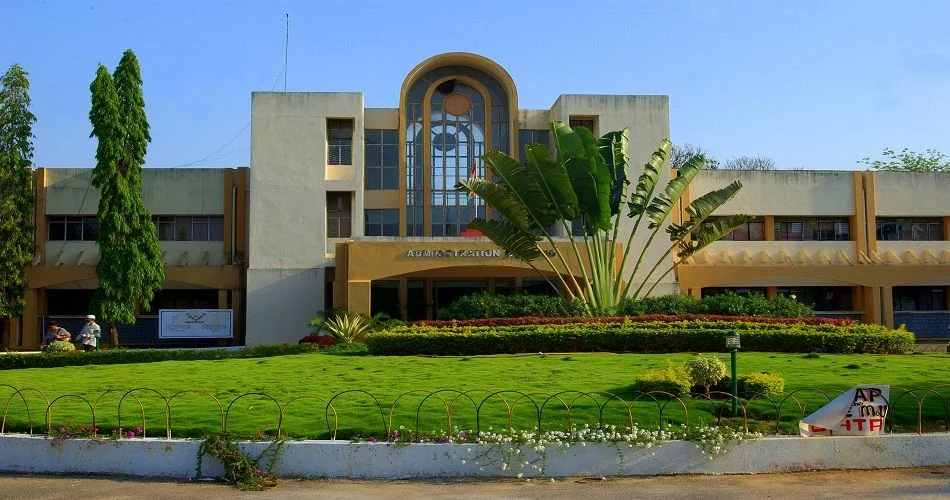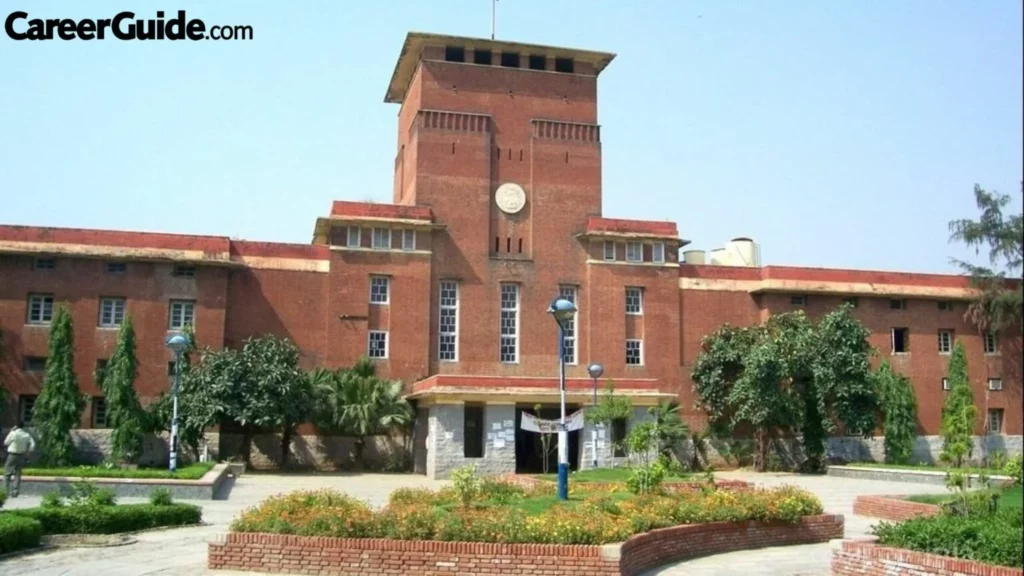After completing 12th class students can apply for integrated B.Sc and M.Sc Courses and after completing B.Sc can apply for an M.Sc Physics course. For clearing entrance, examination students should read out the syllabus carefully. Exam cut-off can vary slightly every year, a student should give his best efforts. A good provides a good alumni network that can help students to get good options in the future. Here is an article on top m sc physics colleges in india. here is an article on Top Universities for M.Sc Physics.
- Jawaharlal Nehru University, New Delhi
- Banaras Hindu University BHU (BHU)
- University Of Hyderabad
- Calcutta University
- Jamia Milia Islamia
- Central University Of Punjab
- Aligarh Muslim University
- Central University Of Rajasthan
- University Of Delhi
- Tezpur University
- Top M.Sc in Physics Colleges in Delhi NCR
- Frequently Asked Questions
Jawaharlal Nehru University, New Delhi

JNU College’s NIRF ranking in the year 2020 was on 2nd. There is a total of 40 seats in the M.Sc Physics course. The best college for students who want to go into the research field. Research emphasis on Chemical Physics, Complex Fluids, Material Science, Mathematical Physics, Nonlinear Optics, etc. Students need to give exams conducted by NTA. The syllabus of the entrance exam is the same as of the IIT JAM exam for physics.
| Admission | Eligibility | Colleges Offering MSc Physics at JNU | Syllabus |
|---|---|---|---|
| Entrance Exam-based (JNUEE) | Bachelor’s degree in Physics or a related field with a minimum of 55% marks or an equivalent grade | School of Physical Sciences, Jawaharlal Nehru University | Classical Mechanics, Quantum Mechanics, Electrodynamics, Statistical Mechanics, Solid State Physics, Nuclear and Particle Physics, Astrophysics, Computational Physics, etc. |
Banaras Hindu University BHU (BHU)

Banaras Hindu University‘s NIRF ranking in the year 2020 was 3. Programs offered for students after bachelors are M.Sc physics, M.Sc Tech GeoPhysics, and MSc Environmental sciences. Best faculty members and all are involved in research. Collaboration with ISRO for research. Students need to give an entrance exam for admissions organized by BHU itself.
| Admission | Eligibility | Colleges Offering MSc Physics at BHU | Syllabus |
|---|---|---|---|
| Entrance Exam-based (BHU PET) | Bachelor’s degree in Physics or a related field with a minimum of 50% marks or an equivalent grade | Department of Physics, Banaras Hindu University | Classical Mechanics, Quantum Mechanics, Electrodynamics, Statistical Mechanics, Solid State Physics, Nuclear Physics, Particle Physics, Astrophysics, Computational Physics, etc. |
University Of Hyderabad

University of Hyderabad‘s NIRF ranking was 6. There are a total of 56 seats in M.Sc Physics. Dedicated faculties and good exposure for students for research work. For admissions, students need to give an entrance exam conducted by the University of Hyderabad itself. After 12th students can take an integrated B.Sc + M.Sc course. The course syllabus is the same as the general B.Sc syllabus.
| Admission | Eligibility | Colleges Offering MSc Physics at University of Hyderabad | Syllabus |
|---|---|---|---|
| Entrance Exam-based (UoH Entrance Exam) | Bachelor’s degree in Physics or a related field with a minimum of 60% marks or an equivalent grade | School of Physics, University of Hyderabad | Classical Mechanics, Quantum Mechanics, Electrodynamics, Statistical Mechanics, Solid State Physics, Nuclear and Particle Physics, Astrophysics, Computational Physics, Experimental Techniques, etc. |
Calcutta University

Calcutta University‘s NIRF ranking was 7. There are a total of 70 seats in M.Sc Physics. Research and Development, the main focus areas include theoretical high energy and nuclear physics, statistical physics, mathematical physics, material physics, electronic laser physics, etc. For admissions, students need to give an entrance exam conducted by the Calcutta University itself for the three-year M.Sc honors course.
| Admission | Eligibility | Colleges Offering MSc Physics at University of Calcutta | Syllabus |
|---|---|---|---|
| Entrance Exam-based (CUET) | Bachelor’s degree in Physics or a related field with a minimum of 55% marks or an equivalent grade | Department of Physics, University of Calcutta | Classical Mechanics, Quantum Mechanics, Electrodynamics, Statistical Mechanics, Solid State Physics, Nuclear Physics, Particle Physics, Astrophysics, Computational Physics, etc. |
Jamia Milia Islamia

Jamia Milia Islamia‘s NIRF ranking was 10. There are a total of 40 seats in top m sc physics colleges in india. Good campus and excellent faculty members. Research and development’s main focus areas include Material Science, Theoretical Physics, and Laser. There is a dedicated research center on the campus, there are various courses on string theory, general relativity, particle physics, etc. For admissions, students need to give an entrance exam conducted by the Jamia Milia Islamia University itself.
| Admission | Eligibility | Colleges Offering MSc Physics at Jamia Millia Islamia | Syllabus |
|---|---|---|---|
| Entrance Exam-based (JMI Entrance Exam) | Bachelor’s degree in Physics or a related field with a minimum of 50% marks or an equivalent grade | Department of Physics, Jamia Millia Islamia | Classical Mechanics, Quantum Mechanics, Electrodynamics, Statistical Mechanics, Solid State Physics, Nuclear Physics, Particle Physics, Astrophysics, Computational Physics, etc. |
Central University Of Punjab

The Central University of Punjab was established in the year of 2009. Research-oriented master’s program for students. Admissions on the basis of the entrance exam CUCET. CUCET is conducted by Rajasthan Central University. The scholarship is also provided to eligible students. One year fee of the M.Sc program is 10,225 INR and the total fee for B.Sc + M.Sc program is 9,091 INR. Girl’s and boys hostel, food court, gym, library, canteen, and wi-fi facilities are available for students.
Aligarh Muslim University

Aligarh Muslim University is among the top universities in India. AMU is a public central university established in 1875. Students with mathematics and physics backgrounds can apply for an M.Sc course from Aligarh Muslim University. Form fee for the entrance exam is 500 INR. There are 50 seats for this two-year master’s course. There are several workshops, recruitment programs, and conferences conducted for students and a good atmosphere for all students Placements in companies like Siemens, Voltas, LNT, TCS, the, etc
Central University Of Rajasthan

The Central University of Rajasthan was established in the year of 2009. After B.sc students can take admissions for two years M.Sc course. The university is accredited with NAAC by A grade and ranked 34 on the NIRF ranking. Admissions on the basis of the entrance exam CUCET. CUCET is conducted by Rajasthan Central University. It is a two-hour duration exam for 100 marks. Different scholarships are also provided to eligible students.
University Of Delhi

University of Delhi‘s NIRF ranking was 11. There are a total of 150 seats in M.Sc Physics. Research and development main focus areas include High Energy, Condensed Matter Physics, Nuclear, Atomic and Molecular, Plasma, etc. Delhi University’s top colleges where you can do M.Sc are Hansraj, Hindu, Miranda house, SGTB, Sri Venkateshwara, and St. Stephen.
Tezpur University

Tezpur University was established in 1994 and is approved by AICTE and UGC. It is accredited to NAAC. Minimum 50% marks in bachelors are required to apply for undergraduate courses. Students need to give the entrance exam which will be of 100 marks. Industry academic interface and different programs to increase social interaction of students. Girl’s and boys hostel, food court, gym, library, canteen, and wi-fi facilities are available for students.
Top M.Sc in Physics Colleges in Delhi NCR
- University of Delhi (DU) – Delhi: DU is a prestigious university that offers top m sc physics colleges in india under its umbrella, such as Hindu College, Miranda House, and St. Stephen’s College.
- Jamia Millia Islamia (JMI) – New Delhi: JMI is a central university known for its quality education in various disciplines, including Physics.
- Jawaharlal Nehru University (JNU) – New Delhi: JNU offers M.Sc in Physics through its School of Physical Sciences and is renowned for its research-oriented approach.
- Indian Institute of Technology (IIT) Delhi – New Delhi: IIT Delhi is one of the premier engineering and science institutes in India, offering M.Sc in Physics with excellent faculty and research facilities.
- Guru Gobind Singh Indraprastha University (GGSIPU) – Delhi: GGSIPU offers M.Sc in Physics through affiliated colleges, providing a good platform for higher studies and research.
- Amity University – Noida: Amity University’s School of Applied Sciences offers M.Sc in Physics with modern laboratories and research opportunities.
- Shiv Nadar University – Greater Noida: The university’s School of Natural Sciences offers M.Sc in Physics, focusing on both theoretical and experimental aspects.
- University of Petroleum and Energy Studies (UPES) – Dehradun: UPES offers M.Sc in Physics with specializations in Energy Studies and Material Science.
Frequently Asked Questions
Q:What is the scope of physics M Sc?
A Master of Science (MSc) in Physics has a very broad scope that covers a variety of physics-related topics. The following are some significant facets of the MSc in Physics’s range:
Advanced Knowledge: Students who earn an MSc in Physics gain advanced knowledge and comprehension of the basic physics theories and principles. It covers a variety of subjects, including thermodynamics, optics, statistical mechanics, quantum physics, electromagnetic, and classical mechanics.
Q:Is there any placement after M.Sc Physics?
For those holding an MSc in Physics, there are placement options available. There are a variety of job choices available in the field of physics, while the majority of graduates prefer to continue their studies or careers in research. The following professions and industries may be of interest to MSc Physics graduates:
Research and development: Many students who get an MSc in physics go on to work in research and development (R&D) positions in both academia and business. They can perform experiments, analyse data, and create new technologies or goods, all of which can further scientific research. Physicists are frequently employed in research and development roles in sectors like materials science, renewable energy, aerospace, electronics, and telecommunications.
Education: You can pursue a profession in education if you have an MSc in physics. Opportunities to teach at high schools exist.
Q:Does M.Sc physics have scope?
- Future Academic Goals: For students interested in pursuing a Ph.D. and conducting advanced research, an MSc in Physics is frequently the first step. With a doctorate, you can progress science, work in renowned research facilities, and even become a professor, passing on your knowledge to the next generation of physicists.
- Physics is a foundational subject that serves as the basis for developments in a number of fields. Your research abilities, laboratory experience, and understanding of complex theoretical ideas are all enhanced by an MSc in physics. In research and development positions, these abilities are extremely valuable.
Q:What is the eligibility criteria for MSc applied Physics?
- Depending on the university and particular programme you are interested in, there may be different requirements for admission to an MSc in Applied Physics. However, the following are some typical general eligibility requirements:
- Background in education: Candidates should normally have a bachelor’s degree in physics or a closely related subject. If a candidate has a solid foundation in Physics and a degree in a closely related field like Engineering or the Physical Sciences, some programmes may accept them.
- Most colleges require applicants to have a minimum grade point average (GPA) or comparable academic accomplishment during their undergraduate studies. A minimum “B” average (or similar) is frequently anticipated, though the precise GPA criterion can change.
- Course Requirements: Some programmes may require prerequisites, such as
Q:Which subject is best for MSc Physics?
- Astrophysics: Focuses on studying celestial bodies, galaxies, and the structure and evolution of the universe. It involves observational and theoretical research in areas such as cosmology, stellar physics, and high-energy astrophysics.
- Particle Physics: Explores the fundamental particles and forces that make up the universe. Particle physics involves studying particle interactions, accelerator-based experiments, and theoretical modeling to understand the fundamental constituents of matter and the nature of the universe.
- Condensed Matter Physics: Concentrates on the physical properties of solid and liquid materials. It involves studying phenomena such as superconductivity, magnetism, quantum mechanics in solids, and the development of new materials with specific properties.
- Nuclear Physics: Focuses on the study of atomic nuclei, their structure, and nuclear reactions. Nuclear physicists investigate topics such as nuclear fusion, fission, radioactive decay, and applications in areas such as nuclear energy and medical imaging.
- Quantum Optics and Quantum Information: Explores the fundamental principles of quantum mechanics and their applications in areas such as quantum computing, quantum cryptography, and quantum communication. It involves studying quantum phenomena related to light, atoms, and quantum systems.
- Biophysics: Applies the principles and techniques of physics to understand biological systems. Biophysicists study the physical properties of biological molecules, cellular processes, and biomechanics, with applications in areas such as medical imaging, drug design, and biomaterials.
- Computational Physics: Focuses on using computational methods and simulations to study and model physical systems. Computational physicists develop and implement algorithms, use numerical methods, and analyze data to solve complex physical problems.






